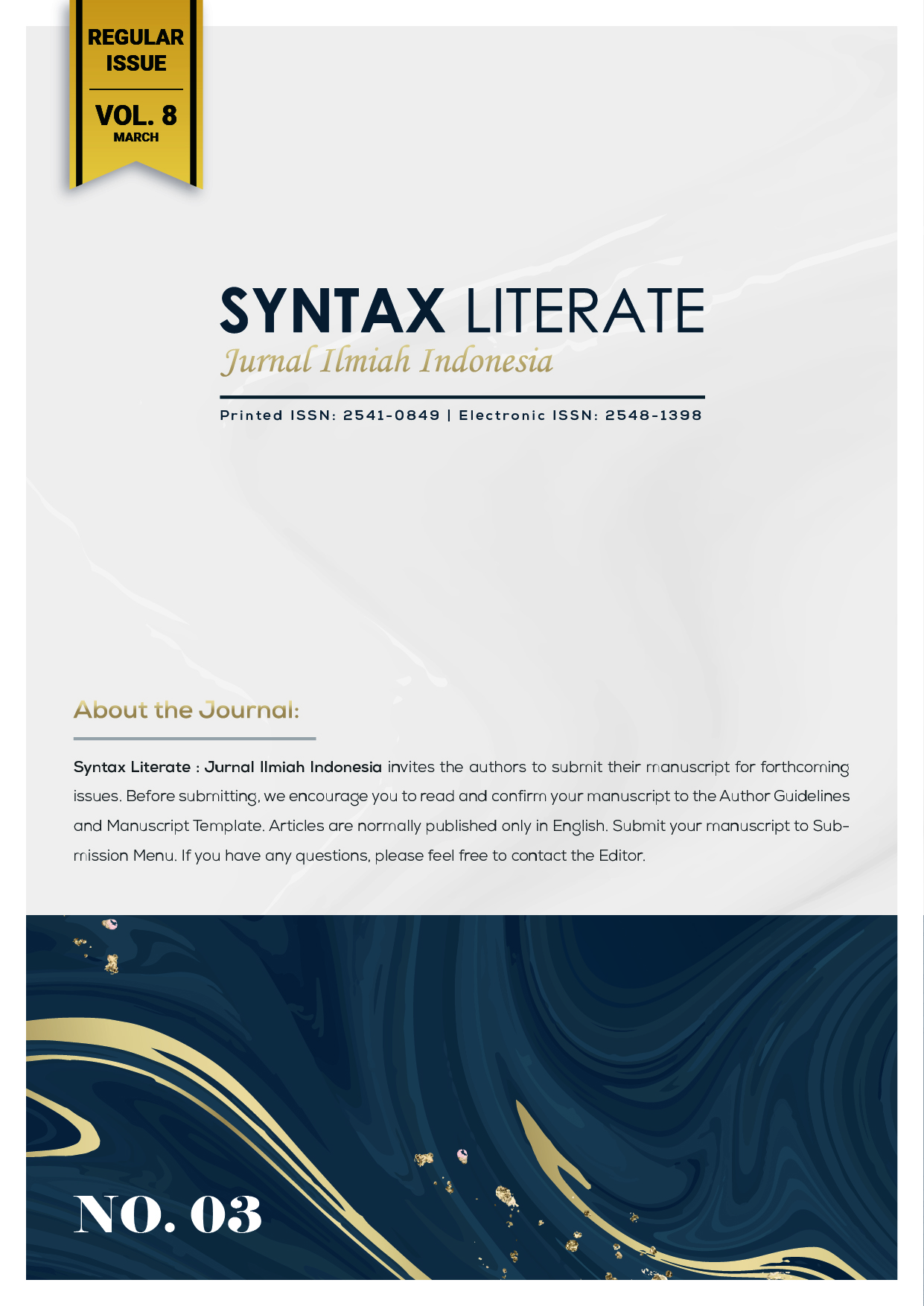The Influence Of Liquidity, Asset Growth, Activity Ratio, and Leverage On The Company-Going Concern
Abstract
Profitability is an essential element to be able to maintain the company’s going concern. This study aims to determine the effect of liquidity, asset growth, leverage, and activity ratio on a company’s going concern proxied by Return on Asset (ROA), which is one of the profitability ratios. This study uses secondary data from the company's annual financial statements published by the Indonesia Stock Exchange (IDX). The population in this study is property and real estate companies listed on the IDX from 2017 to 2021. Furthermore, this study used a purposive sampling technique, resulting in 41 companies being used as research samples. Then the hypothesis is tested using Partial Least Square (PLS) analysis. The results of hypothesis testing show that liquidity and leverage have a negative and significant effect on the company's going concern. The ratio of activities has a positive and significant effect on the company's going concern. Meanwhile, asset growth has a positive and insignificant effect on the company's going concern.
Downloads
References
Hidayat, A. A. N. (2022, October 31). REI: Kuartal III 2022, Industri Properti Turun 14 Persen. Tempo.Co. https://bisnis.tempo.co/read/1651406/rei-kuartal-iii-2022-industri-properti-turun-14-persen
Iclssee. (2022). ICLSSEE 2022 Proceedings of the 2nd International Conference on Law, Social Science, Economics, and Education. EAI Publishing.
Incekara, A., & Centikaya, H. (2019). Liquidity Risk Management: A Comparative Analysis of Panel Data Between Islamic And Conventional Banking In Turkey. Procedia Computer Science, 158, 955–963.
James, H. V., & Wachowicz, J. M. (2005). Prinsip-prinsip Manajemen Keuangan (Fundamental of Financial Management) (D. Fitriasari (ed.); 12th ed.). Salemba Empat.
Kasmir. (2012). Analisis Laporan Keuangan. PT. Raja Grafindo Persada.
Li, Z., Crook, J., Andreeva, G., & Tang, Y. (2019). Predicting the risk of financial distress using corporate governance measures. Pacific-Basin Finance Journal.
Lie, C., Wardani, R. P., & Pikir, T. W. (2016). Pengaruh Likuiditas, Solvabilitas, Profitabilitas, dan Rencana Manajemen terhadap Opini Audit Going Concern (Studi Empiris Perusahaan Manufaktur di BEI). Berkala Akuntansi Dan Keuangan Indonesia, 1(2), 84–105. https://doi.org/10.20473/baki.v1i2.2694
Lombardi, R. (2021). The Going-Concern-Principle in Non-Financial Disclosure Concepts and Future Challenges. Springer International Publishing.
Marusya, Pontororing & Magantar, Mariam.2016.Pengaruh Struktur Modal Terhadap Profitabilitas. Jurnal Berkalah Ilmiah Efesiensi.Volume 16.No.3
Novita, H., Gaol, R. L., Matanari, R., Siahaan, M., & Sarumaha, D. (2022). Analisis Pengaruh Likuiditas , Solvabilitas dan Aktivitas terhadap Profitabilitas pada Perusahaan Manufaktur Makanan yang Terdapat di Bei Periode. 6(April), 1655–1663.
Nur’Aini, T., Sa’adah, L., & Rahmawati, I. (2020). Pengaruh Current Ratio, Debt To Equity Ratio, Return On Equity Terhadap Return: Analisis Pada Perusahaan Food And Beverage Yang Terdaftar Di BEI Tahun 2014-2018. IJAB : Indonesian Journal of Accounting and Business, 2(1), 59–71. https://doi.org/10.33019/accounting.v2i1.14
Rosyid, A., Triyani, W., & Mahmudi, B. (2018). Pengaruh Pertumbuhan Aset Terhadap Nilai Perusahaan Dengan Profitabilitas Sebagai Variabel Intervening (Studi Empiris Perusahaan Sektor Pertambangan yang terdaftar Di Bursa Efek Indonesia Periode 2007 - 2016). 13(1), 107–129.
Simamora, R. A., & Hendarjatno, H. (2019). The effects of audit client tenure, audit lag, opinion shopping, liquidity ratio, and leverage to the going concern audit opinion. Asian Journal of Accounting Research, 4(1), 145–156. https://doi.org/10.1108/AJAR-05-2019-0038/FULL/PDF
Utami, M. T., & Suria, G. (2021). Pengaruh Working Capital Turnover (WCT), Current Ratio (CR), dan Total Assets Turnover (TATO) terhadap Profitabilitas. 8(1), 1–8.
Copyright (c) 2023 Dhian Wahyuni, Rishma Nadya Nurramadhani, Brigita Ayu Puspita Reswari, Nabila Azzahra, I Putu Arya Budi Mahardika

This work is licensed under a Creative Commons Attribution-ShareAlike 4.0 International License.











